Spotlight

In the Midst of Chaos…
Sumaiya Ahsan Bushra
Photos: Kazi Tahsin Agaz Apurbo
In a country like Bangladesh one comes face to face with all kinds of problems. Loopholes in the infrastructure, poor health and sanitary conditions, poverty, traffic congestion and breakdown in the education system are only naming a few, amongst the many. With multiple organs of the nation becoming weak, the future of the nation floats in uncertainty. As is obvious, for developing countries like ours, education is one of the most primary and basic needs. It deserves to have a status of its own because it acts as a ladder which can push a third world nation towards a more promising tomorrow. However, in the midst of such chaos there is hope and this is often seen through the contributions of single entities who have taken incentives to do something big and bring in changes. Monmohini Sikder, a philanthropist, along with the help of Dentist Dr Milan Moskala from the Czech Republic, has thought of transformation and has faith that the nation can see a brighter prospect through the next generation.

Students discussing and sharing their thoughts.
| |
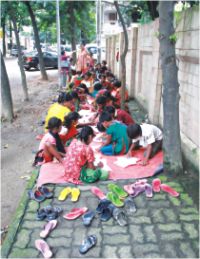 |
| |
All lined up to study. |
Monmohini Sikder has always wanted to teach and has been in the profession since her college days. Having a degree in the Bachelors of Arts in Social Science, Political Science and Bangla under Dhaka University, she has dedicated her life to be a part of the academic and social services. She worked in several schools and slum areas like Korail, under various foundations. Then she decided that she wanted to start her own project -- a school for the underprivileged; Piet Van Street School which is located in Baridhara. Around the same time, she decided that she wanted to teach underprivileged children voluntarily in the Gulshan area and began to collect interested children roaming about in the Gulshan bazaar area, with an agreement made with Dr Moskala. The benevolent foreigner agreed to be the sponsor for this joint venture and has been continuously bearing all necessary costs for Moskala Adventist Mission School ever since its inception in 2010.
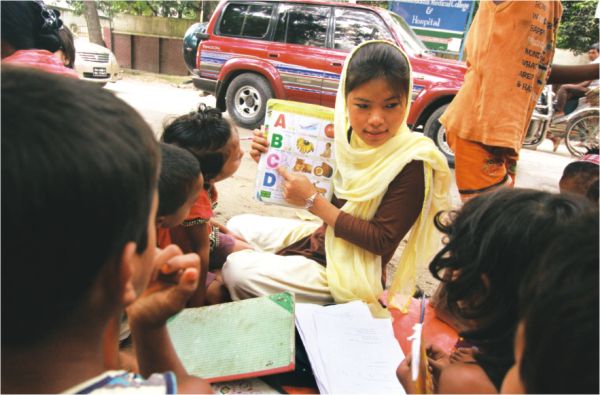
Nayomee Chakma, a student of Marketing teaches these students during her free time.
In addition, there has not been much support from the locality apart from the owners of the home whose boundary area has been used to teach these underprivileged children. They have permitted Sikder and her colleagues to teach there and have allowed them to keep their belongings at the guard-house after school. Apart from this, occasionally random passer-bys and foreigners donate food, clothing and books to the school.
Further on, Dr Moskala established an organised system for the school. There are two supervisors under him who have been asked to devise the syllabus only and are not actively engaged with the teaching of these children. The curriculum is well designed and follows the format of a proper school. It has three levels -- nursery, kindergarten and grade one. In each level the students have to take four quarterly examinations in a year carrying 100 marks each. What is more striking is that these students do not only study the basic subjects like Mathematics, English and Bangla but also have General Knowledge, Drawing and Moral lessons. At times, classes on Health issues are also given to these students to create awareness amongst them from an early age. In addition, it is never all work and no play for them; they too have the option to enjoy a yearly summer vacation of 15 days and Eid holidays for three days. But if classes are missed then a note is made of; the teachers have an attendance book for each level. As for the grading system, there is no hierarchy per say but the students who do well in their academics are given preference while those who lag behind are equally rewarded at the end of the year so that they are motivated to study.
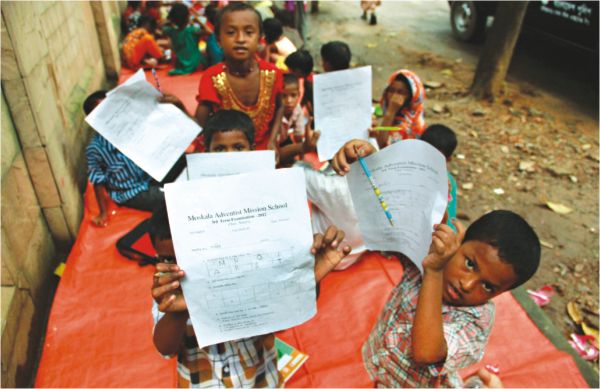
Second term examination held to help the students build a stronger foundation.
These children have different backgrounds but have one thing in common- acute poverty. They wish to be educated and dream to become 'famous' one day but are unable to, due to their condition. Some of them are beggars, domestic workers, dumpster divers and helpers at the local vegetable markets. A few of them baby sit their younger siblings, while their parents work hard for a day's meal. Lima Akhter, a young girl from nursery with bright eyes and a confused smile says, “I am 10, no wait, I am 7 years old. I did not know anything when I came here but now I know so much. My parents are garments workers and I have to look after my siblings at home. Education is not an option for me but my teachers have changed my life.” She adds with enthusiasm spreading all over her face, “I like to study. English is my favourite subject.”
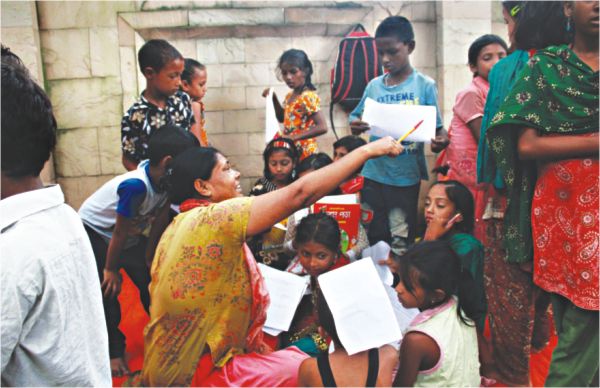
Monmohini Sikder disciplining her students.
With equal eagerness, Borhan, a 10-year-old kindergarten student says, “I am a dumpster diver but I want to become someone big one day. My favourite subject is Bangla. My father sells ribbons and laces on the streets and my mother is a domestic worker. They encourage me to study but when I first came here I was really scared because I did not know any of the Bangla alphabets.”

A comprehensive syllabus is needed for a better education.
Mohammed Oliullah Islam, another student of the same age from a level above, with all seriousness, says, “I like to study and my favourite subject is Bangla as well. My mother works at a house while my father fixes clogged roads during rainy seasons. I also work. I am a tokai!”
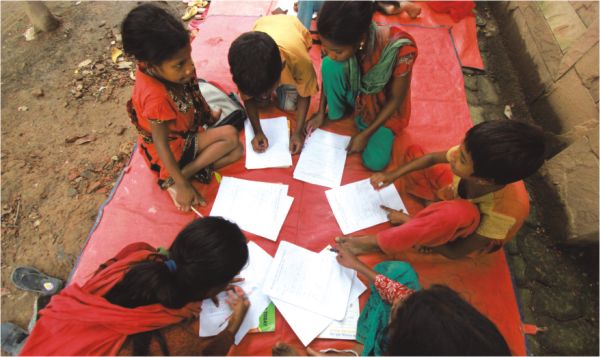
Tests are taken on a regular basis.
Helping these street urchins and bringing them closer to their dreams is what Sikder wants to do for the rest of her life. She also believes in women empowerment and has found two other young women, Nayomee Chakma, a student of second year of Marketing Studies from Khilgaon Model College, and Hira Biswas, a Masters of Arts holder in English from Presidency University, to help fulfil her mission. These three women together run this small school on the pavement attached to a house at the end of road 94 in Gulshan 2. In total there are 65 students and classes are held from Sunday to Thursday, from 12:00 pm to 2:00 pm in the afternoon. They provide the students with all the necessary supplies, worksheets and other materials. At the same time, every day in between classes, there is a small recess where snacks like bananas, samosas or bread are given to the students.
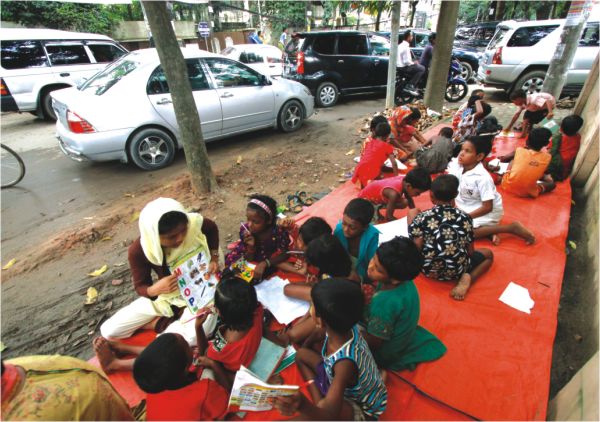
Students are divided into three levels, nursery, kindergarten and grade one.
While Nayomee is responsible for teaching the nursery level, Sikder teaches Kindergarten and Hira grade one. Chakma comes from a financially backward family and assists Dr Moskala in his clinic for an extra income. She says, “Teaching is my passion and I adore the children in my class.” Biswas on the other hand, works at World Vision Bangladesh and at the same time teaches at the school as her work finishes at 12 pm in the afternoon. She claims “I did not quite like teaching at first. My hands were tied as I did not want to sit at home and do nothing. I wasn't able to find a suitable job. But now things have changed and this profession has become more of a passion. I have grown into it and it has become a part of my life.”
The Bible states that everything is possible for him who believes. A little bit of hard work and focus is all one requires to achieve. And as a nation, the day is not far when the possibility to rise above will be just within grasps. As mythology suggests, the immortal bird phoenix dies and then bursts into flames and is reborn from its own ashes. In a similar way, our nation too will rise to make a miraculous comeback.
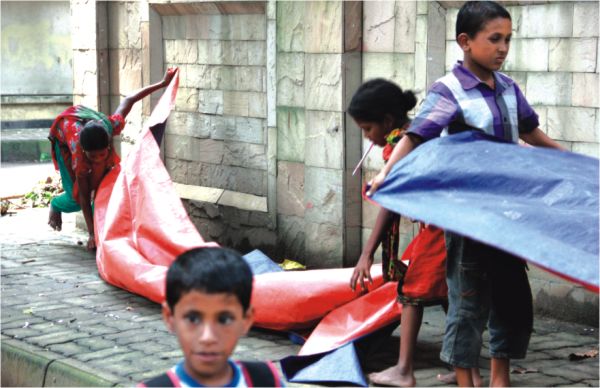
At home time, the students pack up on their own.

With dreams to become someone famous one day.
| 